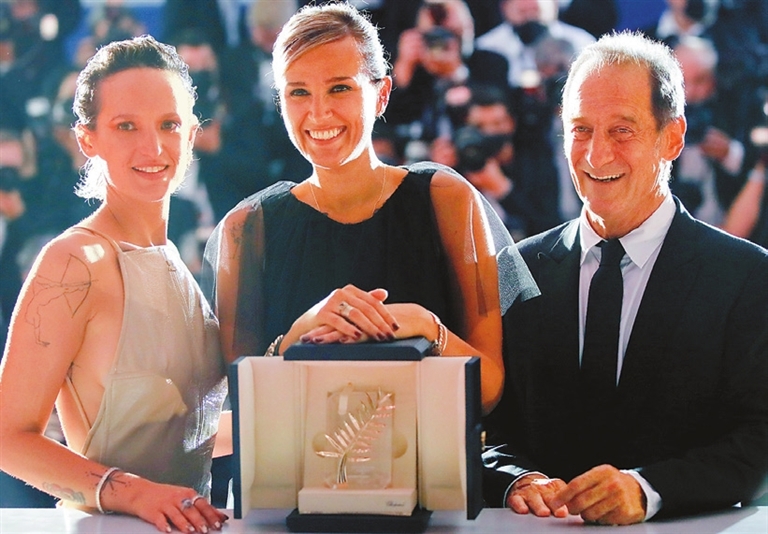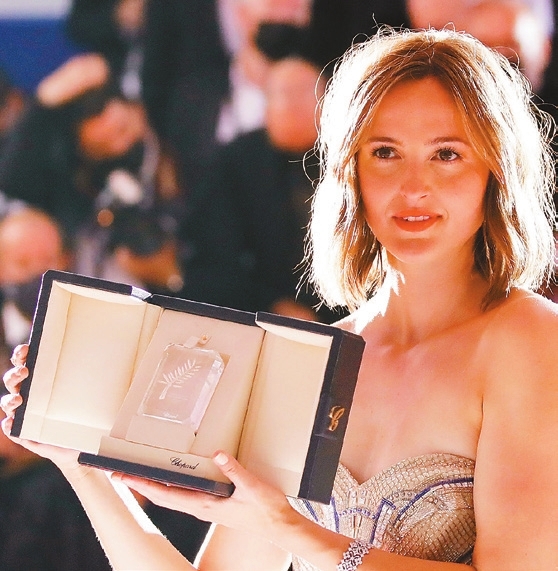


JULIA DUCOURNAU’S “Titane,” a wild body-horror thriller featuring sex with a car and a surprisingly tender heart, won the Palme d’Or at the Cannes Film Festival, making Ducournau just the second female filmmaker to win the festival’s top honor in its 74-year history. The win Saturday was mistakenly announced by jury president Spike Lee at the top of the closing ceremony, broadcast in France on Canal+, unleashing a few moments of confusion. Ducournau, a French filmmaker, didn’t come to the stage to accept the award until the formal announcement at the end of the ceremony. The problems started when Lee was asked to say which prize would be awarded first. Instead, he announced the evening’s final prize, as fellow juror Mati Diop plunged her head into her hands and others rushed to stop him. Lee, himself, spent several moments with his head in his hands before apologizing profusely for taking a lot of the suspense out of the evening. “I have no excuses,” Lee told reporters afterward. “I messed up. I’m a big sports fan. It’s like the guy at the end of the game who misses the free throw.” Ducournau’s win was a long-awaited triumph. The only previous female filmmaker to win Cannes’ top honor — among the most prestigious awards in cinema — was Jane Campion for “The Piano” in 1993. In recent years, frustration at Cannes’ gender parity has grown, including in 2018, when 82 women — including Agnes Varda, Cate Blanchett and Salma Hayek — protested gender inequality on the Cannes red carpet. This year, four out of 24 films up for the Palme were directed by women. The jury said the award for “Titane,” an extremely violent film, came out of a democratic process of conversation and debate. Juror Maggie Gyllenhaal said they didn’t agree unanimously on anything. Lee said, “Everyone was passionate about a particular film they wanted and we worked it out.” In “Titane,” Agathe Rousselle plays a serial killer who flees home. As a child, a car accident leaves her with a titanium plate in her head and a strange bond with automobiles. In possibly the most-talked-about scene at the festival, she’s impregnated by a Cadillac. Lee called it a singular experience. “This is the first film ever where a Cadillac impregnates a woman,” said Lee, who said he wanted to ask Ducournau what year the car was. “That’s genius and craziness together. Those two things often match up.” On stage, Ducournau thanked the jury “for letting the monsters in.” Cannes’ closing ceremony capped 12 days of red-carpet premieres, regular COVID-19 testing for many attendees and the first major film festival held in its usual form since the pandemic began. The grand prize was split between Asghar Farhadi’s Iranian drama “A Hero” and Finnish director Juho Kuosmanen’s “Compartment No. 6.” Best director was awarded to Leos Carax for “Annette,” the fantastical musical starring Adam Driver and Marion Cotillard that opened the festival. The award was accepted by the musical duo Sparks, Ron and Russell Mael, who wrote the script and music for the film. Jurors also split the jury prize. That was awarded to both Nadav Lapid’s “Ahed’s Knee,” an impassioned drama about creative freedom in modern Isreal; and to Thai filmmaker Apichatpong Weerasthakul’s “Memoria,” a meditative film starring Tilda Swinton. Caleb Landry Jones took home the best actor prize for his performance as an Australian mass killer in the fact-based “Nitram” by Justin Kurzel. Renate Reinsve won best actress for Joachim Trier’s “The Worst Person in the World.” Best screenplay went to Ryusuke Hamaguchi’s “Drive My Car,” a Haruki Murakami adaptation he penned with Takamasa Oe. The Croatian coming-of-age drama “Murina” by Antoneta Alamat Kusijanović took the Camera d’Or award, a non-jury prize, for best first feature. Kusijanović was absent from the ceremony after giving birth a day earlier.(SD-Agencies) | 
